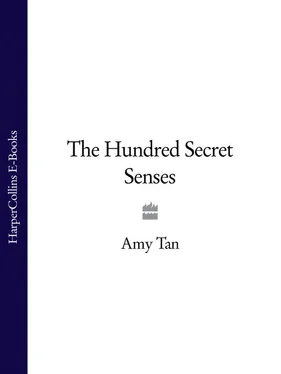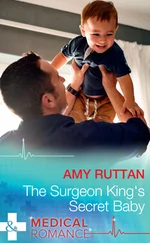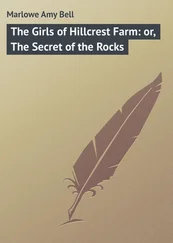Aunt Betty had a theory about the marriage as well. ‘Your dad was good-looking, for a Chinese man. He was college-educated. And he spoke English like me and your mom. Now why would he marry a little peasant girl? Because he had to , that’s why.’ By then, I was old enough to know what had to meant.
Whatever the case, in 1948, my father’s first wife died of a lung disease, perhaps TB. My father went to Hong Kong to search for work. He left Kwan in the care of his wife’s younger sister, Li Bin-bin, who lived in a small mountain village called Changmian. Of course, he sent money for their support – what father would not? But in 1949, the Communists took over China, and it was impossible for my father to return for his five-year-old daughter. So what else could he do? With a heavy heart, he left for America to start a new life and forget about the sadness he left behind. Eleven years later, while he was dying in the hospital, the ghost of his first wife appeared at the foot of his bed. ‘Claim back your daughter,’ she warned, ‘or suffer the consequences after death!’ That’s the story my father gave just before he died – that is, as told by Aunt Betty years later.
Looking back, I can imagine how my mom must have felt when she first heard this. Another wife? A daughter in China? We were a modern American family. We spoke English. Sure, we ate Chinese food, but take-out, like everyone else. And we lived in a ranch-style house in Daly City. My father worked for the Government Accounting Office. My mother went to PTA meetings. She had never heard my father talk about Chinese superstitions before; they attended church and bought life insurance instead.
After my father died, my mother kept telling everyone how he had treated her ‘just like a Chinese empress.’ She made all sorts of grief-stricken promises to God and my father’s grave. According to Aunt Betty, at the funeral, my mother vowed never to remarry. She vowed to teach us children to do honor to the Yee family name. She vowed to find my father’s firstborn child, Kwan, and bring her to the United States.
The last promise was the only one she kept.
My mother has always suffered from a kind heart, compounded by seasonal rashes of volunteerism. One summer, she was a foster mother for Yorkie Rescue; the house still stinks of dog pee. For two Christmases, she dished out food to the homeless at St. Anthony’s Dining Room; now she goes away to Hawaii with whoever is her current boyfriend. She’s circulated petitions, done fund-raising, served on boards of alternative-health groups. While her enthusiasm is genuine, eventually, always, it runs out and then she’s on to something new. I suspect she thought of Kwan as a foreign exchange student she would host for a year, a Chinese Cinderella, who would become self-sufficient and go on to have a wonderful American life.
During the time before Kwan came, Mom was a cheerleader, rallying my brothers and me to welcome a big sister into our lives. Tommy was too little to do anything except nod whenever Mom said, ‘Aren’t you excited about having another big sister?’ Kevin just shrugged and acted bored. I was the only one who did jumping jacks like a gung-ho recruit, in part because I was ecstatic to learn Kwan would be in addition to me, not instead of.
Although I was a lonely kid, I would have preferred a new turtle or even a doll, not someone who would compete for my mother’s already divided attention and force me to share the meager souvenirs of her love. In recalling this, I know that my mother loved me – but not absolutely. When I compared the amount of time she spent with others – even total strangers – I felt myself sliding further down the ranks of favorites, getting bumped and bruised. She always had plenty of room in her life for dates with men or lunch with her so-called gal pals. With me, she was unreliable. Promises to take me to the movies or the public pool were easily erased with excuses or forgetfulness, or worse, sneaky variations of what was said and what was meant: ‘I hate it when you pout, Olivia,’ she once told me. ‘I didn’t guarantee I’d go to the swim club with you. I said I would like to .’ How could I argue my need against her intention?
I learned to make things not matter, to put a seal on my hopes and place them on a high shelf, out of reach. And by telling myself that there was nothing inside those hopes anyway, I avoided the wounds of deep disappointment. The pain was no worse than the quick sting of a booster shot. And yet thinking about this makes me ache again. How is it that as a child I knew I should have been loved more? Is everyone born with a bottomless emotional reservoir?
So of course, I didn’t want Kwan as my sister. Just the opposite. Which is why I made great efforts in front of my mother to appear enthusiastic. It was a distorted form of inverse logic: If hopes never come true, then hope for what you don’t want.
Mom had said that a big sister was a bigger version of myself, sweet and beautiful, only more Chinese, and able to help me do all kinds of fun things. So I imagined not a sister but another me, an older self who danced and wore slinky clothes, who had a sad but fascinating life, like a slant-eyed version of Natalie Wood in West Side Story , which I saw when I was five. It occurs to me only now that my mother and I both modeled our hopes after actresses who spoke in accents that weren’t their own.
One night, before my mother tucked me in bed, she asked me if I wanted to pray. I knew that praying meant saying the nice things that other people wanted to hear, which is what my mom did. So I prayed to God and Jesus to help me be good. And then I added that I hoped my big sister would come soon, since my mother had just been talking about that. When I said, ‘Amen,’ I saw she was crying and smiling proudly. Under my mother’s eye I began to collect welcome presents for Kwan. The scarf my aunt Betty gave me for my birthday, the orange blossom cologne I received at Christmas, the gooey Halloween candy – I lovingly placed all these scratchy, stinky, stale items into a box my mother had marked ‘For Olivia’s big sister.’ I convinced myself I had become so good that soon Mom would realize we didn’t need another sister.
My mother later told my brothers and me how difficult it was to find Kwan. ‘In those days,’ she said, ‘you couldn’t just write a letter, stick a stamp on it, and send it to Changmian. I had to cut through mounds of red tape and fill out dozens of forms. And there weren’t too many people who’d go out of their way to help someone from a communist country. Aunt Betty thought I was crazy! She said to me, “How can you take in a nearly grown girl who can’t speak a word of English? She won’t know right from wrong or left from right.”’
Paperwork wasn’t the only obstacle Kwan had to unknowingly surmount. Two years after my father died, Mom married Bob Laguni, whom Kevin today calls ‘the fluke in our mother’s history of dating foreign imports – and that’s only because she thought Laguni was Mexican instead of Italian.’ Mom took Bob’s name, and that’s how my brothers and I also ended up with Laguni, which I gladly changed to Bishop when I married Simon. The point is, Bob never wanted Kwan to come in the first place. And my mom usually put his wishes above everyone else’s. After they divorced – I was in college by then – Mom told me how Bob pressured her, just before they were married, to cancel the paperwork for Kwan. I think she intended to and forgot. But this is what she told me: ‘I watched you pray. You looked so sweet and sad, asking God, “Please send me my big sister from China.”’
I was nearly six by the time Kwan came to this country. We were waiting for her at the customs area of San Francisco Airport. Aunt Betty was also there. My mother was nervous and excited, talking non-stop: ‘Now listen, kids, she’ll probably be shy, so don’t jump all over her. … And she’ll be skinny as a beanpole, so I don’t want any of you making fun of her. …’
Читать дальше












